|
|
 |
KUBO
Mayako : Osan
from "Shinju Ten no Amejima"
<Opera in 2 Acts>
<sung in Japanese>
OPERA HOUSE
|
<OPERA TALK>
Please click here
<REHEARSAL SCENE>
Please click here
|
STAFF
|
| Music by |
: |
Kubo Mayako |
| Libretto by |
|
Kubo Mayako |
| Original by |
: |
Chikamatsu Monzaemon |
| |
|
|
| Conductor |
: |
Kanda Keiichi |
| Production |
: |
Aguni Jun |
| Scenery Design |
: |
Yokota Atsumi |
| Costume Design |
: |
Masuda Emi |
| Lighting Design |
: |
Oshima Masao |
| Stage Manager |
: |
Onita Masahiko |
| Production
Advisor |
: |
Hatanaka Ryosuke |
| |
|
|
| Chorus Master |
: |
Misawa Hirofumi |
| Chorus |
|
New National Theatre Chorus |
| Orchestra |
: |
The Tokyo Symphony Orchestra |
| Presented by |
: |
New National Theatre, Tokyo |
|
|
CAST
|
| Osan |
: |
Nagayoshi Tomoko (25th,27th)
/ Namikawa Hisami (26th) |
| Jiheh |
: |
Shibayama Masanobu (25th,27th)
/ Maiya Takehiko (26th) |
| Koharu |
: |
Morikawa Eiko (25th,27th) /
Yamamoto Mayumi (26th) |
| (
All Performances ) |
|
| Hostesses |
Ringo |
: |
Naono Yoko |
Lemon |
: |
Maeda Yuka |
|
| Momo |
: |
Kaneko Toshie |
Nana |
: |
Hasegawa Mitsue |
|
| |
|
|
|
|
|
|
|
| Alummo |
Akio |
: |
Oki Taro |
Eiji |
: |
Maruyama Tetsuhiro |
|
| Bunsuke |
: |
Umehara Mitsuhiro |
Fumihiko |
: |
Kawashima Naoyuki |
|
| Ciita |
: |
Omoto Kazunori |
Goro |
: |
Tokuyoshi Hiroyuki |
|
| Daichi |
: |
Furukawa Kazuhiko |
Hiroshi |
: |
Chino Masayasu |
|
| Secretary |
: |
Aochi Hideyuki |
|
|
PERFORMANCES
|
| |
| February 2005 |
25
(Fri.) |
26
(Sat.) |
27
(Sun.) |
| 3:00pm |
|
× |
× |
| 6:30pm |
× |
|
|
Doors
will open 45 minutes before the opening of the performance.
Approximate running time: 2 hours, 15 minutes with 1 intermission
|
|
ADVANCE TICKETS
|
| |
Available from Sunday 28 November , 2004
at 10:00am.
To order tickets, please call +81-3-5352-9999 (10:00am-6:00pm).
Internet ticket reservation available through the following Websites.(Japanese only)
http://t.pia.co.jp/
http://eee.eplus.co.jp/
|
|
TICKET PRICES (with tax)
|
| Price(yen) |
12,600 |
11,550 |
8,820 |
7,770 |
6,300 |
5,250 |
4,200 |
3,150 |
1,500 |
|
*Balcony
row 4 centre and row 3-4 sides (¥3,150): Sold at the
NNTT Box Office
and all Ticket Pia outlets on the performance date only. Up to 2
tickets per person. No phone reservations.
*Seat Z (¥1,500): Sold to students only at some Ticket
Pia outlets on the day before the performance. Any tickets not sold
by the performance date will be released to the general public at
the NNTT Box
Office and some Ticket Pia outlets. One ticket per person. No phone
reservations. Students must bring a valid student ID. *Same
day student tickets ( 50% off Except
for seats for ¥3,150 and
¥1,500) :
Sold at the NNTT
Box Office and some Ticket Pia outlets on the performance date.
One ticket per person. No phone reservations. Students must bring
a valid student ID.
*Opera House Ticket Prices & Seating Plan
|
Endless
Conflicts of Love, Financial Crisis, and Success
World Premiere of a New Opera That Portrays from the Life of a Woman
in Modern Japan from Various Angles
|
![handbill [Osan, from "Shinju Ten no Amejima"]](../../../season/s250/images/bill250.jpg)
One of the main pillars of the program lineup of The New National
Theatre, Tokyo (NNTT), is the performance of operas by Japanese
composers. The NNTT has produced eight such works, from Takeru,
performed to commemorate the grand opening of the theatre, to Narukami
and Shunkan. Each of these works has aroused the interest
of the audience and became the talk of the town for its subject,
music performance, and stage direction. Osan---from Shinju Ten
no Amijima was composed by Kubo Mayako, who has been highly
praised in Europe for the successful performance of the opera Rashomon,
which she wrote at the request of the Opernhaus Buhnen Graz in Austria
and the organizers of the Steirischer Herbst (Styrian Autumn) Festival,
and other accomplishments. Osan is a romantic tragedy based
on Chikamatsu Monzaemon's play Shinju Ten no Amijima, which
stems from eroticism and reason. Inspired by the conflicts of love
in Chikamatsu's play and early capitalism against which the play
was written, Kubo sets Osan in modern Japan and depicts the
life of Osan---a woman who has led her business to success and is
at the peak of her prosperity---with focus on the conflicting emotions
of love and the pangs of conscience she goes through.
<Note by the Composer>
There is no end to the stimulation my imagination receives from original drama
by Chikamatsu. This testifies that the original drama is rich
in content. Why did Osan intend to rescue Jiheh and Koharu without
thinking of herself? Why was Jiheh unable to make a decision to
choose between his wife and Koharu? Was Osan simply a good wife
and wise mother? Answers are varied. I want to write about the
absurdity of love based on humanism derived from Chikamatsu rather
than his Shinju Ten no Amijima.
Synopsis
The setting is a banquet hall in which a splendid party is being
held with a large attendance to celebrate the completion of the
new office building of a company, Taiyo Sangyo. The female president
of the company, Osan, is visiting each table to greet the guests.
While praising her business ability, those attending also engage
in backbiting, saying that she was so enthusiastic about her work
that she has never experienced a woman's happiness. Her husband
took another lover, fell into debt and ran away, and is now suspected
of murder. Subsequently, Osan took over her husband's company
and reconstructed it. She moves to another room and casually turns
on a radio, which reports that her husband Jiheh has been found
dead. Osan is struck speechless with astonishment. Her memory
traces back to 10 years ago...
|
| <Music> |
<Conductor> |
<Production> |
 |
 |
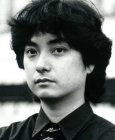 |
| Kubo Mayako |
Kanda Keiichi |
Aguni Jun |
|
| <Cast> |
 |
 |
 |
 |
 |
| Nagayoshi Tomoko |
Namikawa Hisami |
Shibayama Masanobu |
Maiya Takehiko |
Morikawa Eiko |
 |
 |
 |
 |
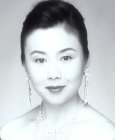 |
| Yamamoto Mayumi |
Naono Yoko |
Kaneko Toshie |
Maeda Yuka |
Hasegawa Mitsue |
 |
 |
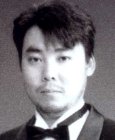 |
 |
 |
| Oki Taro |
Umehara Mitsuhiro |
Omoto Kazunori |
Furukawa Kazuhiko |
Maruyama Tetsuhiro |
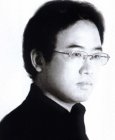 |
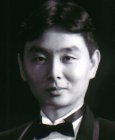 |
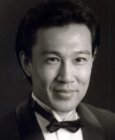 |
 |
| Kawashima Naoyuki |
Tokuyoshi Hiroyuki |
Chino Masayasu |
Aochi Hideyuki |
|
|
![handbill [Osan, from "Shinju Ten no Amejima"]](../../../season/s250/images/bill250.jpg)





















